Detailed Examination of Marxist Critique of Capitalism and Alienation
VerifiedAdded on 2022/11/15
|9
|2028
|191
Essay
AI Summary
This essay undertakes an analysis of Karl Marx's critique of capitalism, particularly focusing on his theory of alienation. The essay begins by outlining the core tenets of Marxism, including historical materialism, class struggle, and the relationship between the working class and the capitalist society. It then delves into Marx's concept of alienation, detailing how workers are alienated from the products of their labor, the means of production, and their own "species-essence." The essay further examines the economic and social consequences of this alienation, highlighting the exploitation inherent in capitalist systems. It explores how capitalists profit from the labor of workers while the workers themselves receive meager wages, leading to a widening gap between the classes. The essay also touches upon the support Marx's critique found from other thinkers like Adam Smith and Fredrich Hegel. The conclusion emphasizes the enduring relevance of Marx's critique as a framework for analyzing capitalism and its impact on the working class, arguing that his concepts of economic and social alienation provide a persuasive critique of the system.
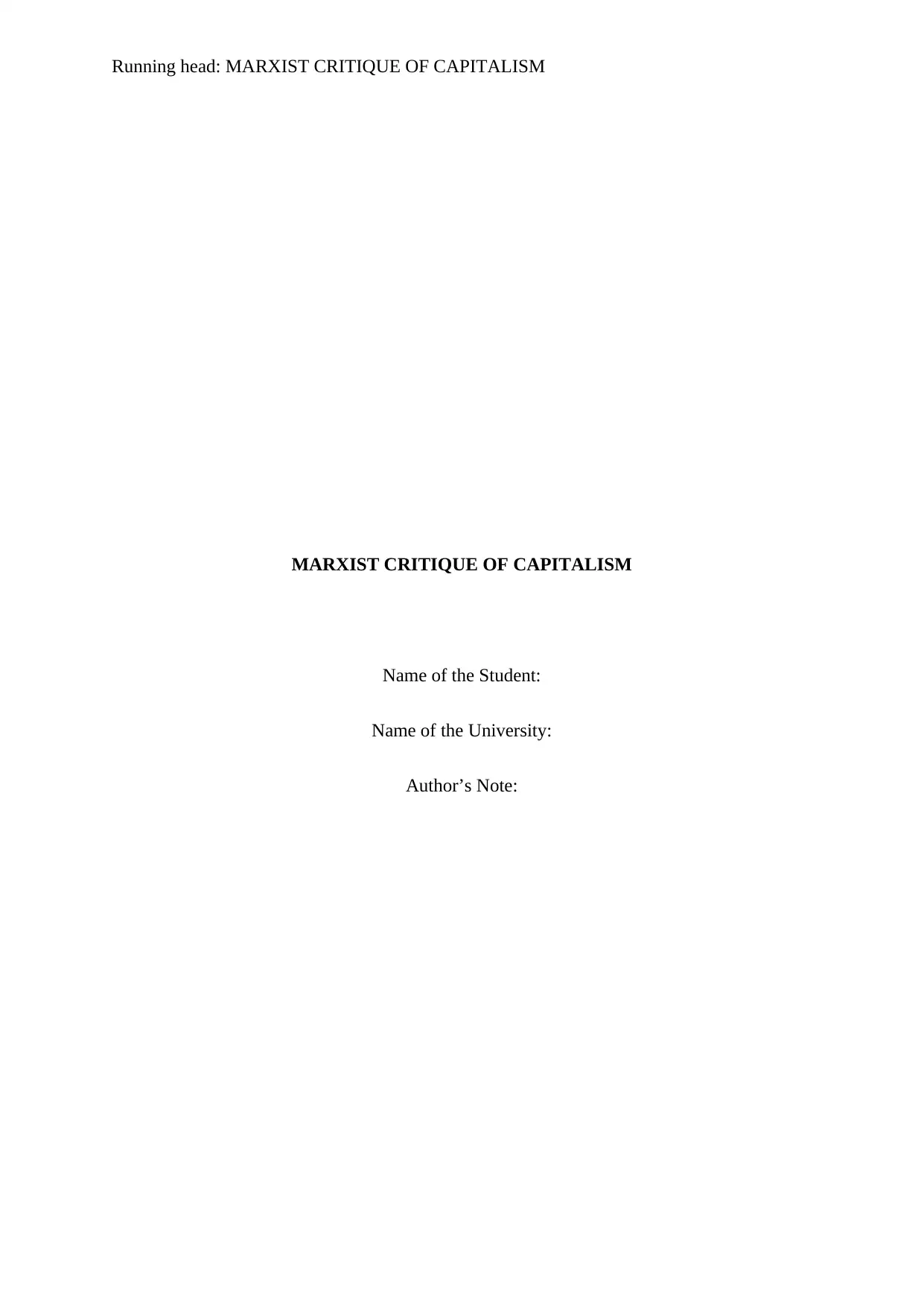
Running head: MARXIST CRITIQUE OF CAPITALISM
MARXIST CRITIQUE OF CAPITALISM
Name of the Student:
Name of the University:
Author’s Note:
MARXIST CRITIQUE OF CAPITALISM
Name of the Student:
Name of the University:
Author’s Note:
Paraphrase This Document
Need a fresh take? Get an instant paraphrase of this document with our AI Paraphraser
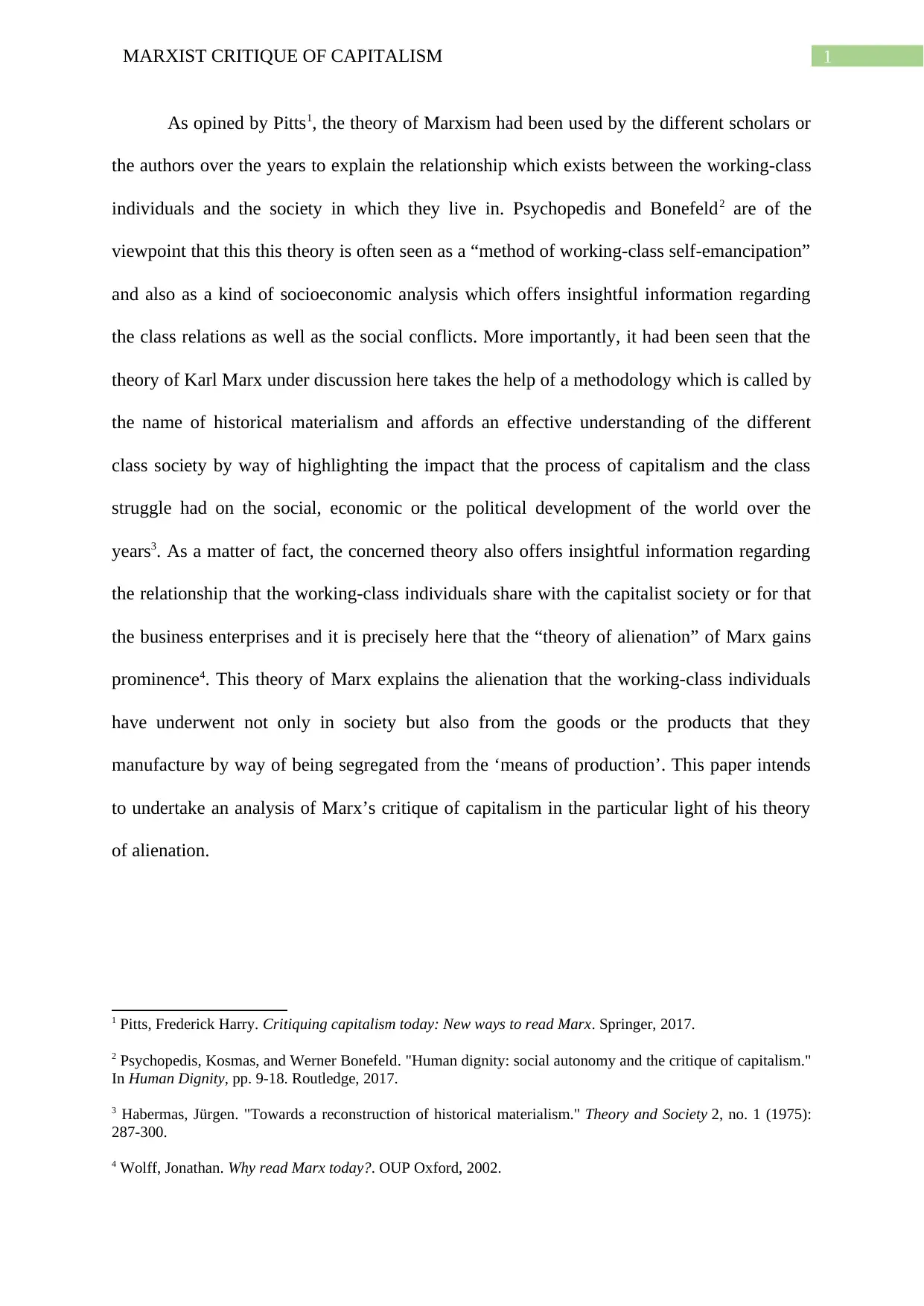
1MARXIST CRITIQUE OF CAPITALISM
As opined by Pitts1, the theory of Marxism had been used by the different scholars or
the authors over the years to explain the relationship which exists between the working-class
individuals and the society in which they live in. Psychopedis and Bonefeld2 are of the
viewpoint that this this theory is often seen as a “method of working-class self-emancipation”
and also as a kind of socioeconomic analysis which offers insightful information regarding
the class relations as well as the social conflicts. More importantly, it had been seen that the
theory of Karl Marx under discussion here takes the help of a methodology which is called by
the name of historical materialism and affords an effective understanding of the different
class society by way of highlighting the impact that the process of capitalism and the class
struggle had on the social, economic or the political development of the world over the
years3. As a matter of fact, the concerned theory also offers insightful information regarding
the relationship that the working-class individuals share with the capitalist society or for that
the business enterprises and it is precisely here that the “theory of alienation” of Marx gains
prominence4. This theory of Marx explains the alienation that the working-class individuals
have underwent not only in society but also from the goods or the products that they
manufacture by way of being segregated from the ‘means of production’. This paper intends
to undertake an analysis of Marx’s critique of capitalism in the particular light of his theory
of alienation.
1 Pitts, Frederick Harry. Critiquing capitalism today: New ways to read Marx. Springer, 2017.
2 Psychopedis, Kosmas, and Werner Bonefeld. "Human dignity: social autonomy and the critique of capitalism."
In Human Dignity, pp. 9-18. Routledge, 2017.
3 Habermas, Jürgen. "Towards a reconstruction of historical materialism." Theory and Society 2, no. 1 (1975):
287-300.
4 Wolff, Jonathan. Why read Marx today?. OUP Oxford, 2002.
As opined by Pitts1, the theory of Marxism had been used by the different scholars or
the authors over the years to explain the relationship which exists between the working-class
individuals and the society in which they live in. Psychopedis and Bonefeld2 are of the
viewpoint that this this theory is often seen as a “method of working-class self-emancipation”
and also as a kind of socioeconomic analysis which offers insightful information regarding
the class relations as well as the social conflicts. More importantly, it had been seen that the
theory of Karl Marx under discussion here takes the help of a methodology which is called by
the name of historical materialism and affords an effective understanding of the different
class society by way of highlighting the impact that the process of capitalism and the class
struggle had on the social, economic or the political development of the world over the
years3. As a matter of fact, the concerned theory also offers insightful information regarding
the relationship that the working-class individuals share with the capitalist society or for that
the business enterprises and it is precisely here that the “theory of alienation” of Marx gains
prominence4. This theory of Marx explains the alienation that the working-class individuals
have underwent not only in society but also from the goods or the products that they
manufacture by way of being segregated from the ‘means of production’. This paper intends
to undertake an analysis of Marx’s critique of capitalism in the particular light of his theory
of alienation.
1 Pitts, Frederick Harry. Critiquing capitalism today: New ways to read Marx. Springer, 2017.
2 Psychopedis, Kosmas, and Werner Bonefeld. "Human dignity: social autonomy and the critique of capitalism."
In Human Dignity, pp. 9-18. Routledge, 2017.
3 Habermas, Jürgen. "Towards a reconstruction of historical materialism." Theory and Society 2, no. 1 (1975):
287-300.
4 Wolff, Jonathan. Why read Marx today?. OUP Oxford, 2002.
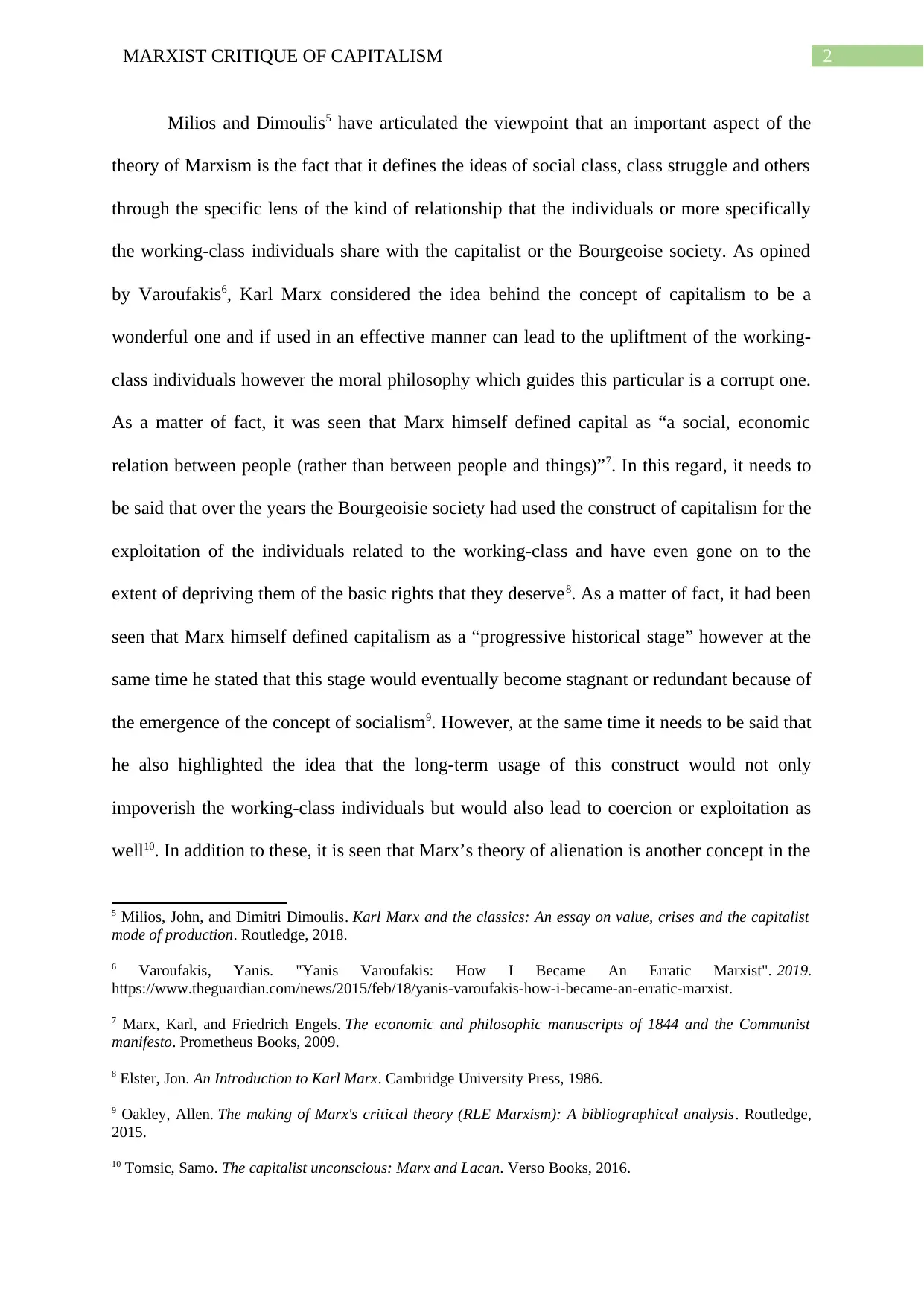
2MARXIST CRITIQUE OF CAPITALISM
Milios and Dimoulis5 have articulated the viewpoint that an important aspect of the
theory of Marxism is the fact that it defines the ideas of social class, class struggle and others
through the specific lens of the kind of relationship that the individuals or more specifically
the working-class individuals share with the capitalist or the Bourgeoise society. As opined
by Varoufakis6, Karl Marx considered the idea behind the concept of capitalism to be a
wonderful one and if used in an effective manner can lead to the upliftment of the working-
class individuals however the moral philosophy which guides this particular is a corrupt one.
As a matter of fact, it was seen that Marx himself defined capital as “a social, economic
relation between people (rather than between people and things)”7. In this regard, it needs to
be said that over the years the Bourgeoisie society had used the construct of capitalism for the
exploitation of the individuals related to the working-class and have even gone on to the
extent of depriving them of the basic rights that they deserve8. As a matter of fact, it had been
seen that Marx himself defined capitalism as a “progressive historical stage” however at the
same time he stated that this stage would eventually become stagnant or redundant because of
the emergence of the concept of socialism9. However, at the same time it needs to be said that
he also highlighted the idea that the long-term usage of this construct would not only
impoverish the working-class individuals but would also lead to coercion or exploitation as
well10. In addition to these, it is seen that Marx’s theory of alienation is another concept in the
5 Milios, John, and Dimitri Dimoulis. Karl Marx and the classics: An essay on value, crises and the capitalist
mode of production. Routledge, 2018.
6 Varoufakis, Yanis. "Yanis Varoufakis: How I Became An Erratic Marxist". 2019.
https://www.theguardian.com/news/2015/feb/18/yanis-varoufakis-how-i-became-an-erratic-marxist.
7 Marx, Karl, and Friedrich Engels. The economic and philosophic manuscripts of 1844 and the Communist
manifesto. Prometheus Books, 2009.
8 Elster, Jon. An Introduction to Karl Marx. Cambridge University Press, 1986.
9 Oakley, Allen. The making of Marx's critical theory (RLE Marxism): A bibliographical analysis. Routledge,
2015.
10 Tomsic, Samo. The capitalist unconscious: Marx and Lacan. Verso Books, 2016.
Milios and Dimoulis5 have articulated the viewpoint that an important aspect of the
theory of Marxism is the fact that it defines the ideas of social class, class struggle and others
through the specific lens of the kind of relationship that the individuals or more specifically
the working-class individuals share with the capitalist or the Bourgeoise society. As opined
by Varoufakis6, Karl Marx considered the idea behind the concept of capitalism to be a
wonderful one and if used in an effective manner can lead to the upliftment of the working-
class individuals however the moral philosophy which guides this particular is a corrupt one.
As a matter of fact, it was seen that Marx himself defined capital as “a social, economic
relation between people (rather than between people and things)”7. In this regard, it needs to
be said that over the years the Bourgeoisie society had used the construct of capitalism for the
exploitation of the individuals related to the working-class and have even gone on to the
extent of depriving them of the basic rights that they deserve8. As a matter of fact, it had been
seen that Marx himself defined capitalism as a “progressive historical stage” however at the
same time he stated that this stage would eventually become stagnant or redundant because of
the emergence of the concept of socialism9. However, at the same time it needs to be said that
he also highlighted the idea that the long-term usage of this construct would not only
impoverish the working-class individuals but would also lead to coercion or exploitation as
well10. In addition to these, it is seen that Marx’s theory of alienation is another concept in the
5 Milios, John, and Dimitri Dimoulis. Karl Marx and the classics: An essay on value, crises and the capitalist
mode of production. Routledge, 2018.
6 Varoufakis, Yanis. "Yanis Varoufakis: How I Became An Erratic Marxist". 2019.
https://www.theguardian.com/news/2015/feb/18/yanis-varoufakis-how-i-became-an-erratic-marxist.
7 Marx, Karl, and Friedrich Engels. The economic and philosophic manuscripts of 1844 and the Communist
manifesto. Prometheus Books, 2009.
8 Elster, Jon. An Introduction to Karl Marx. Cambridge University Press, 1986.
9 Oakley, Allen. The making of Marx's critical theory (RLE Marxism): A bibliographical analysis. Routledge,
2015.
10 Tomsic, Samo. The capitalist unconscious: Marx and Lacan. Verso Books, 2016.
⊘ This is a preview!⊘
Do you want full access?
Subscribe today to unlock all pages.

Trusted by 1+ million students worldwide
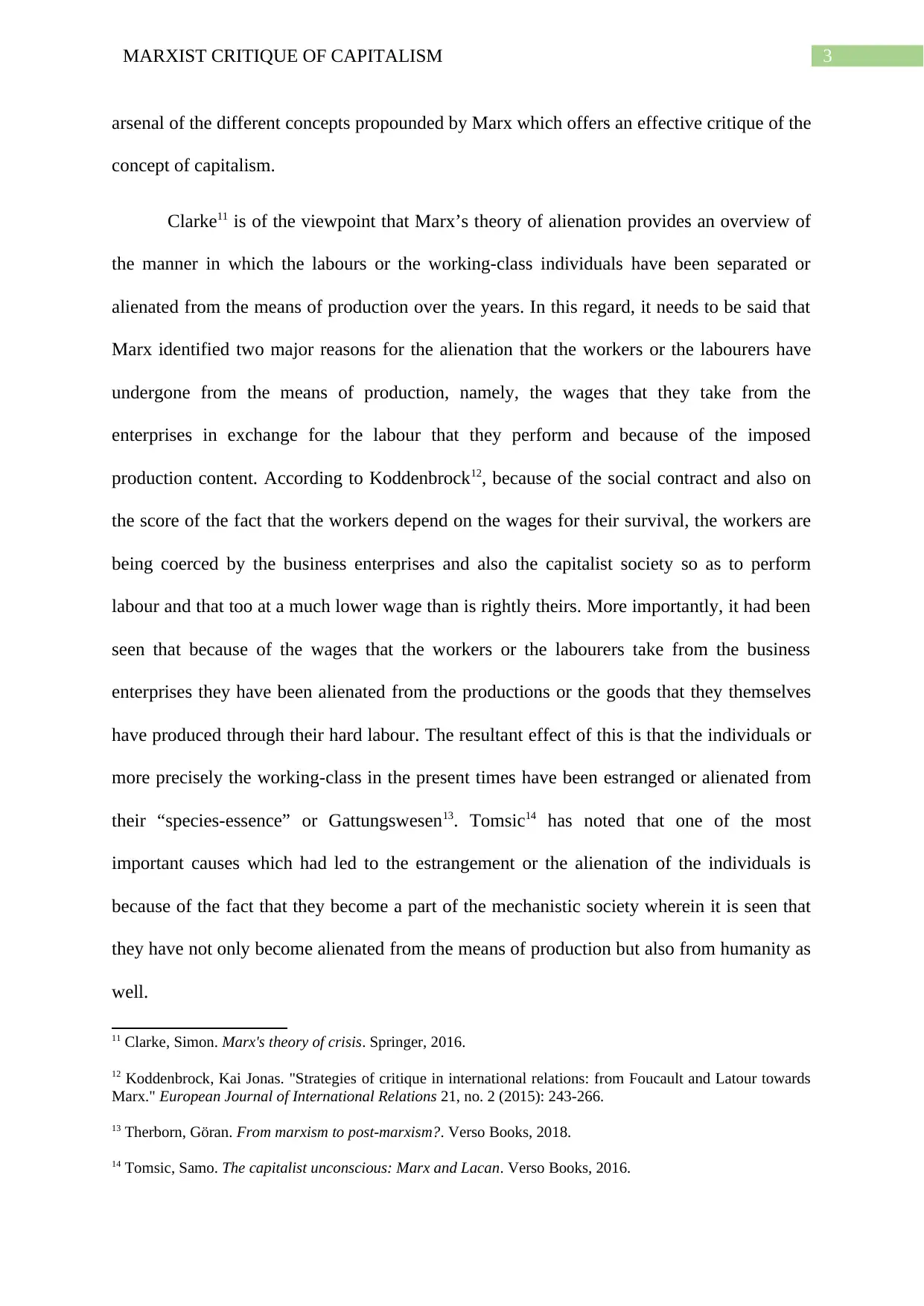
3MARXIST CRITIQUE OF CAPITALISM
arsenal of the different concepts propounded by Marx which offers an effective critique of the
concept of capitalism.
Clarke11 is of the viewpoint that Marx’s theory of alienation provides an overview of
the manner in which the labours or the working-class individuals have been separated or
alienated from the means of production over the years. In this regard, it needs to be said that
Marx identified two major reasons for the alienation that the workers or the labourers have
undergone from the means of production, namely, the wages that they take from the
enterprises in exchange for the labour that they perform and because of the imposed
production content. According to Koddenbrock12, because of the social contract and also on
the score of the fact that the workers depend on the wages for their survival, the workers are
being coerced by the business enterprises and also the capitalist society so as to perform
labour and that too at a much lower wage than is rightly theirs. More importantly, it had been
seen that because of the wages that the workers or the labourers take from the business
enterprises they have been alienated from the productions or the goods that they themselves
have produced through their hard labour. The resultant effect of this is that the individuals or
more precisely the working-class in the present times have been estranged or alienated from
their “species-essence” or Gattungswesen13. Tomsic14 has noted that one of the most
important causes which had led to the estrangement or the alienation of the individuals is
because of the fact that they become a part of the mechanistic society wherein it is seen that
they have not only become alienated from the means of production but also from humanity as
well.
11 Clarke, Simon. Marx's theory of crisis. Springer, 2016.
12 Koddenbrock, Kai Jonas. "Strategies of critique in international relations: from Foucault and Latour towards
Marx." European Journal of International Relations 21, no. 2 (2015): 243-266.
13 Therborn, Göran. From marxism to post-marxism?. Verso Books, 2018.
14 Tomsic, Samo. The capitalist unconscious: Marx and Lacan. Verso Books, 2016.
arsenal of the different concepts propounded by Marx which offers an effective critique of the
concept of capitalism.
Clarke11 is of the viewpoint that Marx’s theory of alienation provides an overview of
the manner in which the labours or the working-class individuals have been separated or
alienated from the means of production over the years. In this regard, it needs to be said that
Marx identified two major reasons for the alienation that the workers or the labourers have
undergone from the means of production, namely, the wages that they take from the
enterprises in exchange for the labour that they perform and because of the imposed
production content. According to Koddenbrock12, because of the social contract and also on
the score of the fact that the workers depend on the wages for their survival, the workers are
being coerced by the business enterprises and also the capitalist society so as to perform
labour and that too at a much lower wage than is rightly theirs. More importantly, it had been
seen that because of the wages that the workers or the labourers take from the business
enterprises they have been alienated from the productions or the goods that they themselves
have produced through their hard labour. The resultant effect of this is that the individuals or
more precisely the working-class in the present times have been estranged or alienated from
their “species-essence” or Gattungswesen13. Tomsic14 has noted that one of the most
important causes which had led to the estrangement or the alienation of the individuals is
because of the fact that they become a part of the mechanistic society wherein it is seen that
they have not only become alienated from the means of production but also from humanity as
well.
11 Clarke, Simon. Marx's theory of crisis. Springer, 2016.
12 Koddenbrock, Kai Jonas. "Strategies of critique in international relations: from Foucault and Latour towards
Marx." European Journal of International Relations 21, no. 2 (2015): 243-266.
13 Therborn, Göran. From marxism to post-marxism?. Verso Books, 2018.
14 Tomsic, Samo. The capitalist unconscious: Marx and Lacan. Verso Books, 2016.
Paraphrase This Document
Need a fresh take? Get an instant paraphrase of this document with our AI Paraphraser
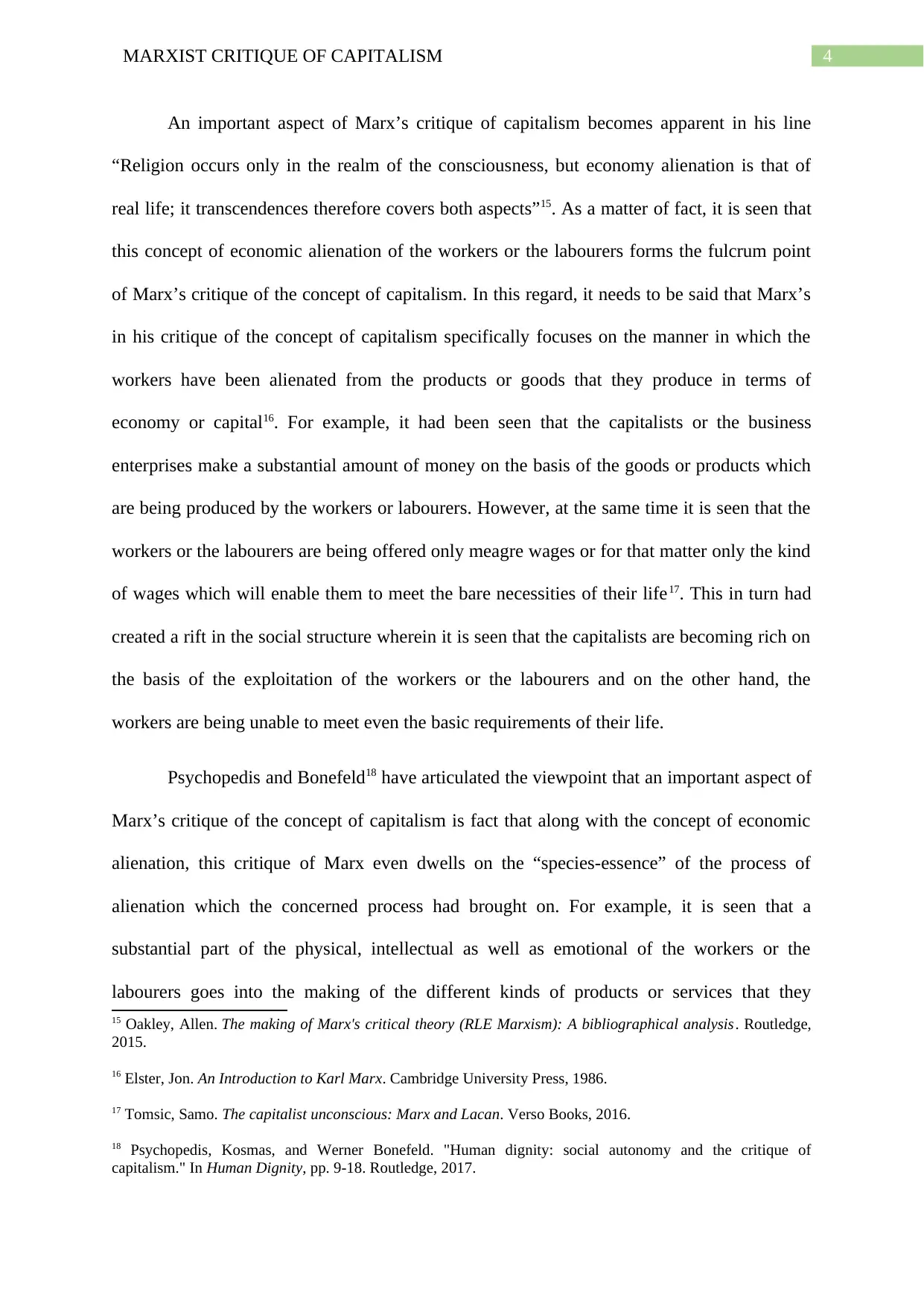
4MARXIST CRITIQUE OF CAPITALISM
An important aspect of Marx’s critique of capitalism becomes apparent in his line
“Religion occurs only in the realm of the consciousness, but economy alienation is that of
real life; it transcendences therefore covers both aspects”15. As a matter of fact, it is seen that
this concept of economic alienation of the workers or the labourers forms the fulcrum point
of Marx’s critique of the concept of capitalism. In this regard, it needs to be said that Marx’s
in his critique of the concept of capitalism specifically focuses on the manner in which the
workers have been alienated from the products or goods that they produce in terms of
economy or capital16. For example, it had been seen that the capitalists or the business
enterprises make a substantial amount of money on the basis of the goods or products which
are being produced by the workers or labourers. However, at the same time it is seen that the
workers or the labourers are being offered only meagre wages or for that matter only the kind
of wages which will enable them to meet the bare necessities of their life17. This in turn had
created a rift in the social structure wherein it is seen that the capitalists are becoming rich on
the basis of the exploitation of the workers or the labourers and on the other hand, the
workers are being unable to meet even the basic requirements of their life.
Psychopedis and Bonefeld18 have articulated the viewpoint that an important aspect of
Marx’s critique of the concept of capitalism is fact that along with the concept of economic
alienation, this critique of Marx even dwells on the “species-essence” of the process of
alienation which the concerned process had brought on. For example, it is seen that a
substantial part of the physical, intellectual as well as emotional of the workers or the
labourers goes into the making of the different kinds of products or services that they
15 Oakley, Allen. The making of Marx's critical theory (RLE Marxism): A bibliographical analysis. Routledge,
2015.
16 Elster, Jon. An Introduction to Karl Marx. Cambridge University Press, 1986.
17 Tomsic, Samo. The capitalist unconscious: Marx and Lacan. Verso Books, 2016.
18 Psychopedis, Kosmas, and Werner Bonefeld. "Human dignity: social autonomy and the critique of
capitalism." In Human Dignity, pp. 9-18. Routledge, 2017.
An important aspect of Marx’s critique of capitalism becomes apparent in his line
“Religion occurs only in the realm of the consciousness, but economy alienation is that of
real life; it transcendences therefore covers both aspects”15. As a matter of fact, it is seen that
this concept of economic alienation of the workers or the labourers forms the fulcrum point
of Marx’s critique of the concept of capitalism. In this regard, it needs to be said that Marx’s
in his critique of the concept of capitalism specifically focuses on the manner in which the
workers have been alienated from the products or goods that they produce in terms of
economy or capital16. For example, it had been seen that the capitalists or the business
enterprises make a substantial amount of money on the basis of the goods or products which
are being produced by the workers or labourers. However, at the same time it is seen that the
workers or the labourers are being offered only meagre wages or for that matter only the kind
of wages which will enable them to meet the bare necessities of their life17. This in turn had
created a rift in the social structure wherein it is seen that the capitalists are becoming rich on
the basis of the exploitation of the workers or the labourers and on the other hand, the
workers are being unable to meet even the basic requirements of their life.
Psychopedis and Bonefeld18 have articulated the viewpoint that an important aspect of
Marx’s critique of the concept of capitalism is fact that along with the concept of economic
alienation, this critique of Marx even dwells on the “species-essence” of the process of
alienation which the concerned process had brought on. For example, it is seen that a
substantial part of the physical, intellectual as well as emotional of the workers or the
labourers goes into the making of the different kinds of products or services that they
15 Oakley, Allen. The making of Marx's critical theory (RLE Marxism): A bibliographical analysis. Routledge,
2015.
16 Elster, Jon. An Introduction to Karl Marx. Cambridge University Press, 1986.
17 Tomsic, Samo. The capitalist unconscious: Marx and Lacan. Verso Books, 2016.
18 Psychopedis, Kosmas, and Werner Bonefeld. "Human dignity: social autonomy and the critique of
capitalism." In Human Dignity, pp. 9-18. Routledge, 2017.
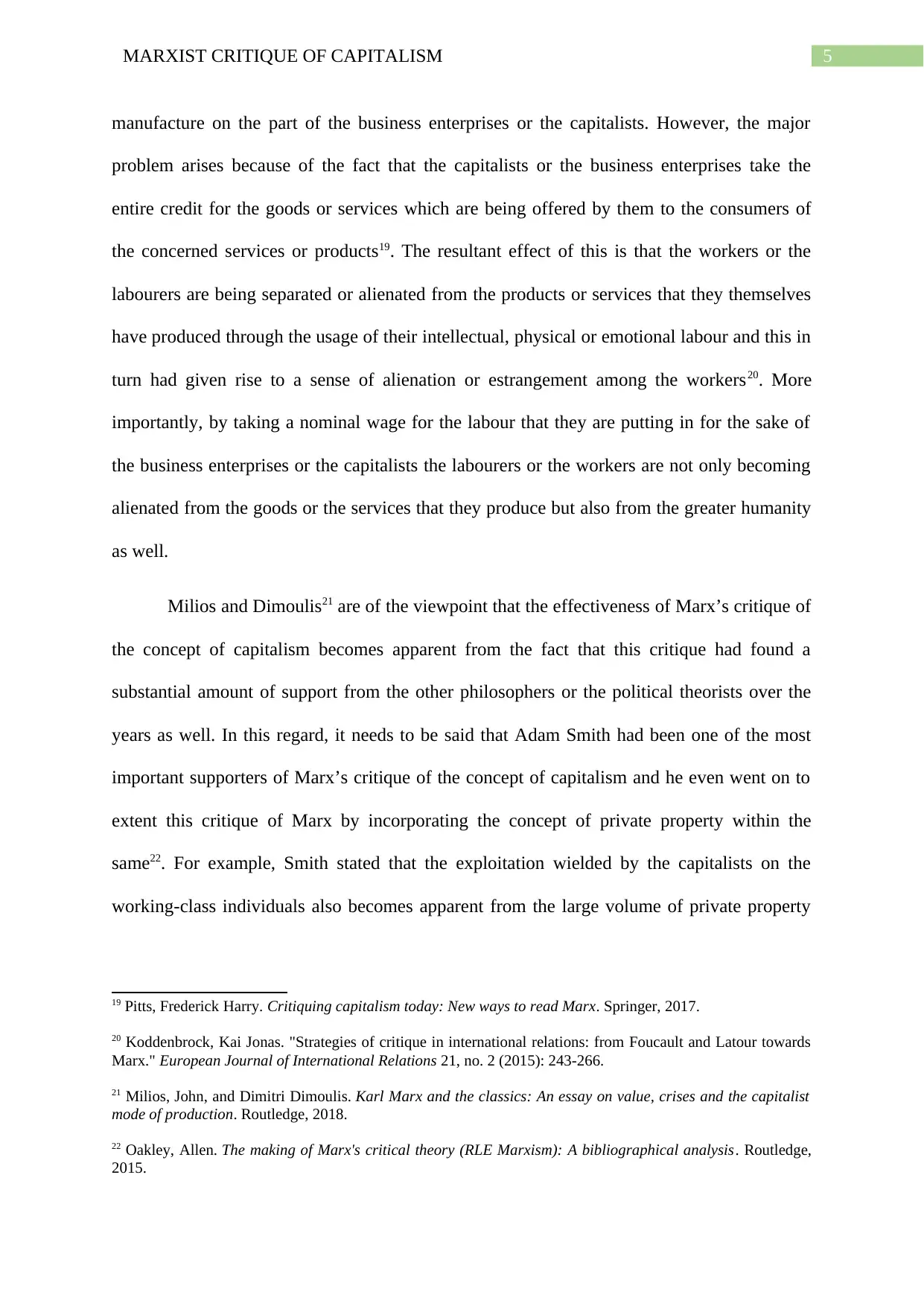
5MARXIST CRITIQUE OF CAPITALISM
manufacture on the part of the business enterprises or the capitalists. However, the major
problem arises because of the fact that the capitalists or the business enterprises take the
entire credit for the goods or services which are being offered by them to the consumers of
the concerned services or products19. The resultant effect of this is that the workers or the
labourers are being separated or alienated from the products or services that they themselves
have produced through the usage of their intellectual, physical or emotional labour and this in
turn had given rise to a sense of alienation or estrangement among the workers20. More
importantly, by taking a nominal wage for the labour that they are putting in for the sake of
the business enterprises or the capitalists the labourers or the workers are not only becoming
alienated from the goods or the services that they produce but also from the greater humanity
as well.
Milios and Dimoulis21 are of the viewpoint that the effectiveness of Marx’s critique of
the concept of capitalism becomes apparent from the fact that this critique had found a
substantial amount of support from the other philosophers or the political theorists over the
years as well. In this regard, it needs to be said that Adam Smith had been one of the most
important supporters of Marx’s critique of the concept of capitalism and he even went on to
extent this critique of Marx by incorporating the concept of private property within the
same22. For example, Smith stated that the exploitation wielded by the capitalists on the
working-class individuals also becomes apparent from the large volume of private property
19 Pitts, Frederick Harry. Critiquing capitalism today: New ways to read Marx. Springer, 2017.
20 Koddenbrock, Kai Jonas. "Strategies of critique in international relations: from Foucault and Latour towards
Marx." European Journal of International Relations 21, no. 2 (2015): 243-266.
21 Milios, John, and Dimitri Dimoulis. Karl Marx and the classics: An essay on value, crises and the capitalist
mode of production. Routledge, 2018.
22 Oakley, Allen. The making of Marx's critical theory (RLE Marxism): A bibliographical analysis. Routledge,
2015.
manufacture on the part of the business enterprises or the capitalists. However, the major
problem arises because of the fact that the capitalists or the business enterprises take the
entire credit for the goods or services which are being offered by them to the consumers of
the concerned services or products19. The resultant effect of this is that the workers or the
labourers are being separated or alienated from the products or services that they themselves
have produced through the usage of their intellectual, physical or emotional labour and this in
turn had given rise to a sense of alienation or estrangement among the workers20. More
importantly, by taking a nominal wage for the labour that they are putting in for the sake of
the business enterprises or the capitalists the labourers or the workers are not only becoming
alienated from the goods or the services that they produce but also from the greater humanity
as well.
Milios and Dimoulis21 are of the viewpoint that the effectiveness of Marx’s critique of
the concept of capitalism becomes apparent from the fact that this critique had found a
substantial amount of support from the other philosophers or the political theorists over the
years as well. In this regard, it needs to be said that Adam Smith had been one of the most
important supporters of Marx’s critique of the concept of capitalism and he even went on to
extent this critique of Marx by incorporating the concept of private property within the
same22. For example, Smith stated that the exploitation wielded by the capitalists on the
working-class individuals also becomes apparent from the large volume of private property
19 Pitts, Frederick Harry. Critiquing capitalism today: New ways to read Marx. Springer, 2017.
20 Koddenbrock, Kai Jonas. "Strategies of critique in international relations: from Foucault and Latour towards
Marx." European Journal of International Relations 21, no. 2 (2015): 243-266.
21 Milios, John, and Dimitri Dimoulis. Karl Marx and the classics: An essay on value, crises and the capitalist
mode of production. Routledge, 2018.
22 Oakley, Allen. The making of Marx's critical theory (RLE Marxism): A bibliographical analysis. Routledge,
2015.
⊘ This is a preview!⊘
Do you want full access?
Subscribe today to unlock all pages.

Trusted by 1+ million students worldwide
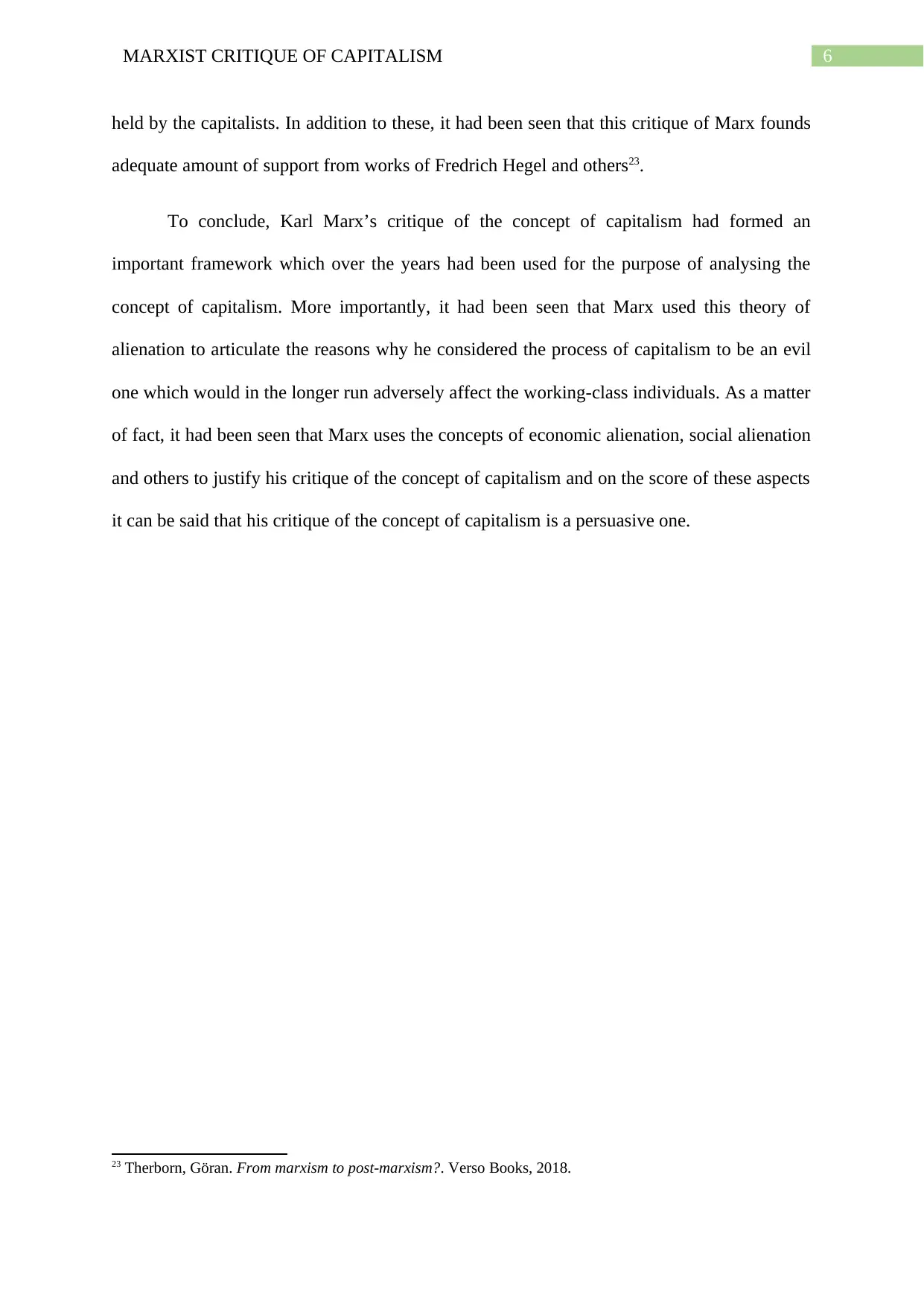
6MARXIST CRITIQUE OF CAPITALISM
held by the capitalists. In addition to these, it had been seen that this critique of Marx founds
adequate amount of support from works of Fredrich Hegel and others23.
To conclude, Karl Marx’s critique of the concept of capitalism had formed an
important framework which over the years had been used for the purpose of analysing the
concept of capitalism. More importantly, it had been seen that Marx used this theory of
alienation to articulate the reasons why he considered the process of capitalism to be an evil
one which would in the longer run adversely affect the working-class individuals. As a matter
of fact, it had been seen that Marx uses the concepts of economic alienation, social alienation
and others to justify his critique of the concept of capitalism and on the score of these aspects
it can be said that his critique of the concept of capitalism is a persuasive one.
23 Therborn, Göran. From marxism to post-marxism?. Verso Books, 2018.
held by the capitalists. In addition to these, it had been seen that this critique of Marx founds
adequate amount of support from works of Fredrich Hegel and others23.
To conclude, Karl Marx’s critique of the concept of capitalism had formed an
important framework which over the years had been used for the purpose of analysing the
concept of capitalism. More importantly, it had been seen that Marx used this theory of
alienation to articulate the reasons why he considered the process of capitalism to be an evil
one which would in the longer run adversely affect the working-class individuals. As a matter
of fact, it had been seen that Marx uses the concepts of economic alienation, social alienation
and others to justify his critique of the concept of capitalism and on the score of these aspects
it can be said that his critique of the concept of capitalism is a persuasive one.
23 Therborn, Göran. From marxism to post-marxism?. Verso Books, 2018.
Paraphrase This Document
Need a fresh take? Get an instant paraphrase of this document with our AI Paraphraser
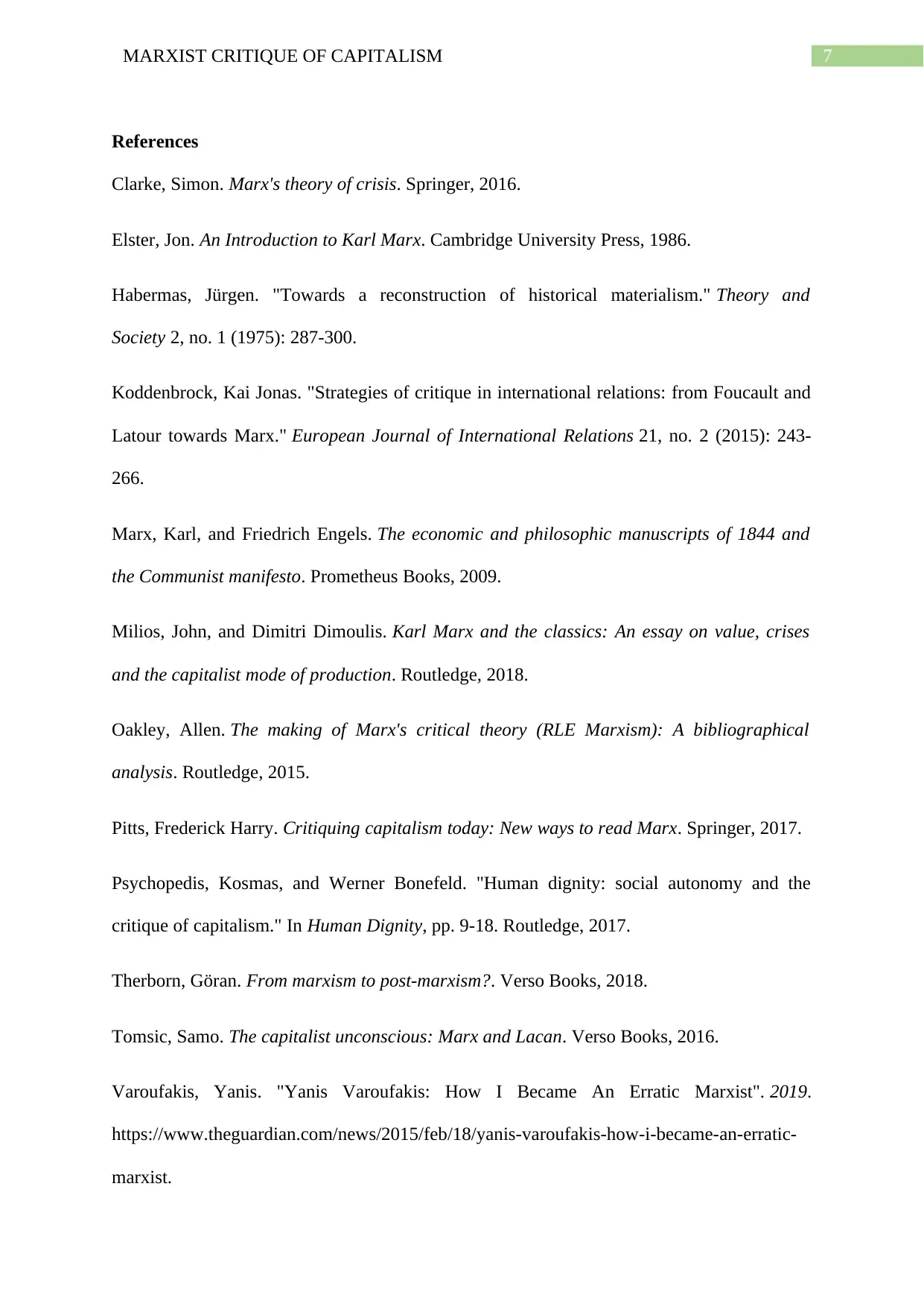
7MARXIST CRITIQUE OF CAPITALISM
References
Clarke, Simon. Marx's theory of crisis. Springer, 2016.
Elster, Jon. An Introduction to Karl Marx. Cambridge University Press, 1986.
Habermas, Jürgen. "Towards a reconstruction of historical materialism." Theory and
Society 2, no. 1 (1975): 287-300.
Koddenbrock, Kai Jonas. "Strategies of critique in international relations: from Foucault and
Latour towards Marx." European Journal of International Relations 21, no. 2 (2015): 243-
266.
Marx, Karl, and Friedrich Engels. The economic and philosophic manuscripts of 1844 and
the Communist manifesto. Prometheus Books, 2009.
Milios, John, and Dimitri Dimoulis. Karl Marx and the classics: An essay on value, crises
and the capitalist mode of production. Routledge, 2018.
Oakley, Allen. The making of Marx's critical theory (RLE Marxism): A bibliographical
analysis. Routledge, 2015.
Pitts, Frederick Harry. Critiquing capitalism today: New ways to read Marx. Springer, 2017.
Psychopedis, Kosmas, and Werner Bonefeld. "Human dignity: social autonomy and the
critique of capitalism." In Human Dignity, pp. 9-18. Routledge, 2017.
Therborn, Göran. From marxism to post-marxism?. Verso Books, 2018.
Tomsic, Samo. The capitalist unconscious: Marx and Lacan. Verso Books, 2016.
Varoufakis, Yanis. "Yanis Varoufakis: How I Became An Erratic Marxist". 2019.
https://www.theguardian.com/news/2015/feb/18/yanis-varoufakis-how-i-became-an-erratic-
marxist.
References
Clarke, Simon. Marx's theory of crisis. Springer, 2016.
Elster, Jon. An Introduction to Karl Marx. Cambridge University Press, 1986.
Habermas, Jürgen. "Towards a reconstruction of historical materialism." Theory and
Society 2, no. 1 (1975): 287-300.
Koddenbrock, Kai Jonas. "Strategies of critique in international relations: from Foucault and
Latour towards Marx." European Journal of International Relations 21, no. 2 (2015): 243-
266.
Marx, Karl, and Friedrich Engels. The economic and philosophic manuscripts of 1844 and
the Communist manifesto. Prometheus Books, 2009.
Milios, John, and Dimitri Dimoulis. Karl Marx and the classics: An essay on value, crises
and the capitalist mode of production. Routledge, 2018.
Oakley, Allen. The making of Marx's critical theory (RLE Marxism): A bibliographical
analysis. Routledge, 2015.
Pitts, Frederick Harry. Critiquing capitalism today: New ways to read Marx. Springer, 2017.
Psychopedis, Kosmas, and Werner Bonefeld. "Human dignity: social autonomy and the
critique of capitalism." In Human Dignity, pp. 9-18. Routledge, 2017.
Therborn, Göran. From marxism to post-marxism?. Verso Books, 2018.
Tomsic, Samo. The capitalist unconscious: Marx and Lacan. Verso Books, 2016.
Varoufakis, Yanis. "Yanis Varoufakis: How I Became An Erratic Marxist". 2019.
https://www.theguardian.com/news/2015/feb/18/yanis-varoufakis-how-i-became-an-erratic-
marxist.
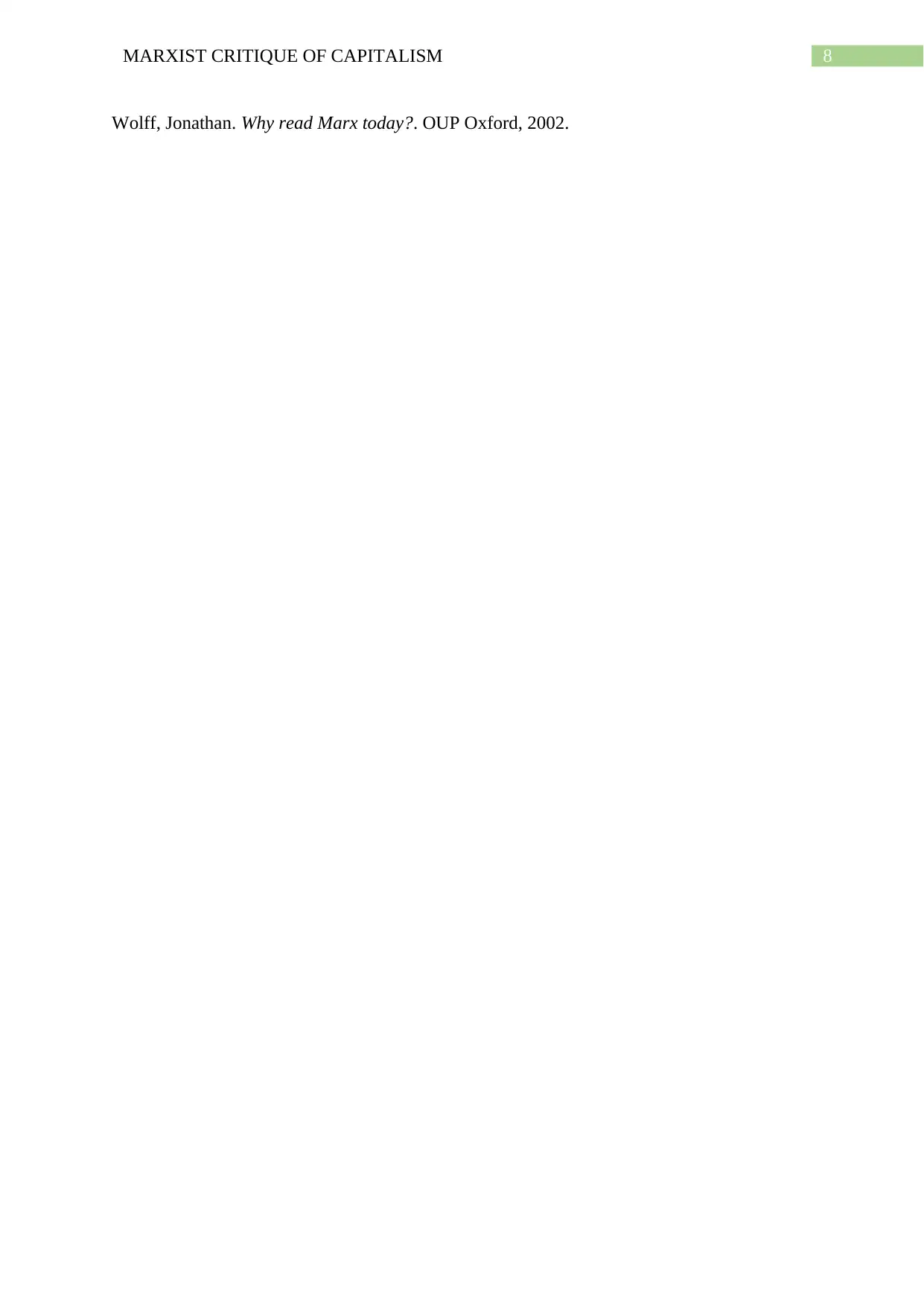
8MARXIST CRITIQUE OF CAPITALISM
Wolff, Jonathan. Why read Marx today?. OUP Oxford, 2002.
Wolff, Jonathan. Why read Marx today?. OUP Oxford, 2002.
⊘ This is a preview!⊘
Do you want full access?
Subscribe today to unlock all pages.

Trusted by 1+ million students worldwide
1 out of 9
Related Documents
Your All-in-One AI-Powered Toolkit for Academic Success.
+13062052269
info@desklib.com
Available 24*7 on WhatsApp / Email
![[object Object]](/_next/static/media/star-bottom.7253800d.svg)
Unlock your academic potential
Copyright © 2020–2026 A2Z Services. All Rights Reserved. Developed and managed by ZUCOL.





